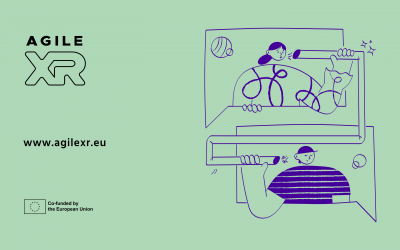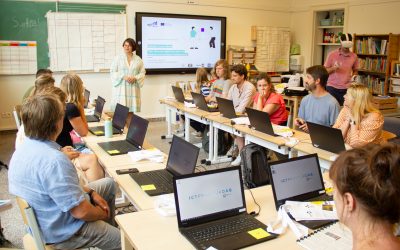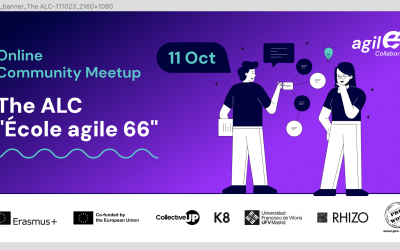An insightful interview with Nuria Coco, a dedicated facilitator at Senbazuru ALC, part of the Origami for Change network. Since 2018, Nuria has been immersed in Agile Learning, working closely with children to foster self-directed education. In this conversation, she shares her experiences, memorable moments, and the challenges faced during the pandemic. Nuria also discusses the potential of digital tools in education and envisions the future of agile and hybrid learning.
Q1: Can you briefly describe your work with Agile Learning?
I work as a facilitator at Senbazuru ALC, part of Origami for Change. Since 2018, I’ve been facilitating a circle of children and gradually training in Agile Methodology with the support of my team. This experience and structured training have equipped me to autonomously facilitate these circles. Last year, I visited Network centers in Mexico, enriching my understanding of Agile Learning through their diverse approaches.
Q2: Please share a memorable story or experience from your work with Agile Learning.
A memorable story for me was a Meeting and Change session where I truly discovered the transformative power of this tool in distributing power. A girl observed that the closing circle, a mandatory end-of-day activity, often interrupted deeply engaging moments for some. We debated this observation, considering everyone’s needs. The facilitators emphasized the importance of closure for reflection and sharing, but the children’s proposal led to the creation of wildcards allowing occasional absences from the circle. This process highlighted the true power-sharing nature of the methodology, showing how we could balance structure and flexibility by understanding and meeting each other’s needs.
Q3: How did you and your colleagues cope with the closure during the pandemic?
Facing the pandemic and home confinement was a significant challenge for Senbazuru. Moving our self-directed, free learning environment online seemed difficult. We used Google Classroom and Google Meet to interact and offer proposals, but it wasn’t easy. Younger children struggle more with online engagement, and the digital divide made access challenging for some families. Despite these obstacles, we found some advantages, like flexible project development and closer connections through video calls. We also used tools like Trello and Mural to help older children manage their intentions and projects online. Overall, the process had more disadvantages than advantages, but we adapted and found ways to make it work.
Q4: Did you continue using any of those digital tools after the pandemic?
Few digital tools we used during confinement have been maintained now that we’re back in our learning center. They were helpful for interactive presentations and sharing information, and we occasionally use them to present projects. However, Senbazuru ALC doesn’t emphasize digitalization. We recognize its potential for older students, but for children under 12, we minimize their contact with digital tools, only allowing them to search for information occasionally.
Q5: Can you share a memorable anecdote or experience from your work with digital tools and/or distance learning?
The most memorable experience of our online Senbazuru time was holding change meetings with all the families. Since the children needed help connecting, their families started joining the meetings. Gradually, we saw the potential of this involvement and invited them to participate regularly. Using a Mural board, it was enriching to share these online meetings with families. In person, exchange meetings are usually just with the children, so having families present was a very enriching experience.
Q6: Have you participated in hybrid teaching or hybrid learning activities?
We recently participated in EduFood Hack, a hybrid hackathon funded by the European Union’s Erasmus Plus program, focused on food waste. It was an enriching experience where we learned many new digital tools, deepened our research, and explored creating prototypes and tools to address food waste.
Q7: Can you imagine hybrid agile learning, what would it be like?
I envision a multicultural environment where people from around the world collaborate on projects of common interest, such as a global research project on helping insects pollinate. Educational centers, schools, and learning communities could connect globally, along with homeschooling children and experts from various fields. This would create diverse interactions and offer significant growth and enrichment.
Q8: What do you think could be the potential of digital tools for distance and/or hybrid learning in the specific context of agile learning?
Digital tools in distance or hybrid learning offer immense potential for agile learning by leveraging their versatility and accessibility. They enable individuals to organize and manage tasks anytime, anywhere, which fosters a sense of self-direction. With a smartphone, individuals can instantly access tools that help coordinate activities, organize information on digital boards, and conduct research effectively. This capability supports the entire cycle of self-directed learning, empowering learners with robust tools designed to enhance their educational journey.
Q9: From your personal perspective, how do you see the future of education and learning?
I foresee significant shifts in education towards personalized learning based on competencies rather than uniform curricula. Public schools are already moving towards experiential and competency-based learning, which I expect to continue. Digital tools are integral to this evolution, offering flexibility and accessibility. However, their environmental impact and resource demands suggest digitalization may be limited to more affluent contexts. Educators must undergo personal transformation to effectively integrate these tools into learning processes, ensuring they enhance rather than overshadow curriculum goals. For centers like Senbazuru ALC, promoting self-directed learning and collaborative skills remains crucial for the future.
Follow our social media channels to be the first to know about upcoming news, and don’t miss out on this opportunity to connect with professionals within our community.
👍 https://www.linkedin.com/company/agile4collaboration
📷 Image by Jeronimo Sarmiento











0 Comments